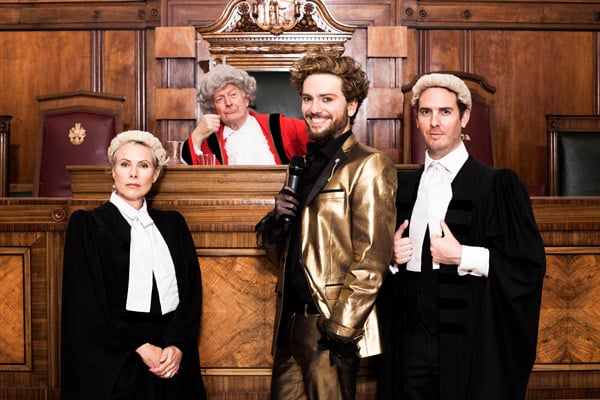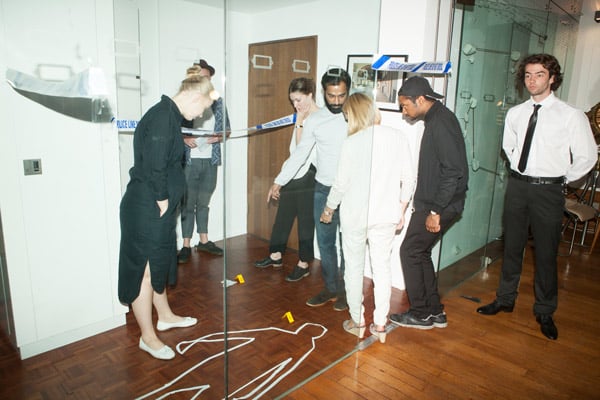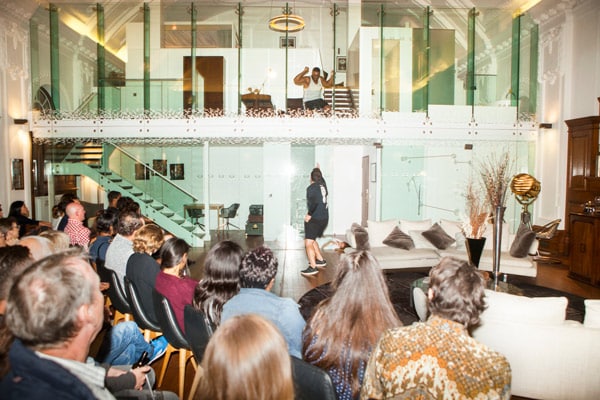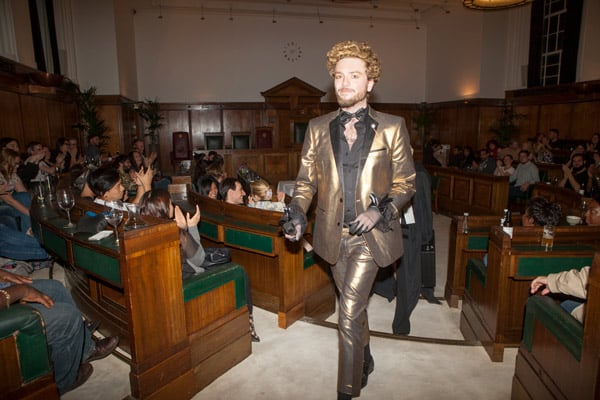NEWS TICKER
REVIEW: Code 2021: Autumn Secret Theatre Project, Bethnal Green ✭
Published on
October 13, 2016
By
julianeaves

Code 2021: Autumn Secret Theatre Project
Bethnall Green
11 October 2016
1 Star
You know a production is in trouble when the set is the star of the show. And when that set is a huge, elaborate building, a rambling Edwardian town hall in Bethnal Green, since converted into a splendidly opulent hotel, with its marble staircases and vaulted reception halls, Angus McBeans (reproductions) on the walls and palms waving their fronds in the cool, long corridors and vestibules, the trouble is big. And thus it was with Secret Theatre’s latest offering.
The intrepid, if ultra-discreet, ensemble, Secret Studio Lab, took over the former Council Chamber for the bulk of the performance, a space preserved more or less intact, panelled in Australian walnut and with green leather upholstery on its capacious concentric rows of seating, although the effect of civic sobriety is now rather muted by the addition of a soothingly plush cream carpet. There we were presented with an essentially regulation issue court-room drama, strongly reminiscent of the OJ Simpson case. Now, trial-based drama has a long and very well established pedigree. Audiences are extremely familiar with the niceties of crown court protocol, and when cast as the jury in a murder trial, as we were here, they go far from blindly into their apportioned role.

It is a bold and daring company, then, that puts its public into such a position. When adopting such a hyper-naturalistic approach, you have to get the details right, or any inaccuracy will become immediately apparent, corroding the efforts you are making to establish credibility and meaning in what you are doing.
Such qualms, sadly, seem not to have troubled the inventors of this 'Trial TV' opus. Dodging any requirement for convincing verisimilitude, the author and director of this entertainment (the perhaps less than strictly disciplined Richard Crawford) has pushed events four years into the future, and disencumbered himself from any compelling need to stick to the facts. To begin with, we were asked to swallow the whole affair being not in the hands of - say - lovely, trusty Judge Judy, but instead a tackily accoutred spiv by the name of Rip Love, frontman of some ghastly 'reality TV' exploitation. And that in a court of law, ladies and gentlemen of the jury! I will put it to you, that in abandoning the standards expected of it by the theatregoing public, the perpetrators of this drama have, in the eyes of artistic integrity, failed in their duty of care and to a grievous and most damaging extent.

While we plodded through the wholly predictable mechanics of a trial (squeezed into just under three roomy hours), we observed some but by-passed just as many of the most elementary rules of the game. In short order we were carted off to another of the handsome rooms in the building (a lofty reception hall now converted into a single 'room': the main space broad and generous enough to contain rows of seating for the audience, an acting 'area' around an over-over-size sofa and double-length sideboard, and accessorised by a Steinway grand). There, we faced a wall of glazing, through which we espied, rather like the interior of an ant-hill displayed to the public in the insect house of a zoo, a maisonette-sized suite of rooms designed in the contemporary, Stark-hotel-esque manner, which stood in for a 'reconstruction' of the scene of the crime. There, for our benefit, two 're-enactments' of the murder were enacted: one each for prosecution and defence. And it was here that Secret Studio Lab made another really serious mistake.
Ladies and gentlemen, as previously intimated, the charge brought against the accused (although there was no 'dock' in the council chamber, and the prisoner was seated a l'americain next to his defence counsel) was murder. Yet, here, the CPS brazenly presented us with an entirely unpremeditated and egregiously provoked crime passionel: in other words - manslaughter. Nobody in the trial seemed to notice. Everyone in the audience did. Oh, dear. Bang went a large amount of our ability to care about the outcome.
Back in the room, we were introduced to the long parade of witnesses, each of whom began, just as they should, by stating their full name (if not actually swearing to tell the truth, the whole truth, and... oh, why bother!?). None of these witnesses ever had a middle name. Not impossible, but statistically highly unlikely. The script was full of annoying, silly imperfections like this, each eroding yet more of our ability to tolerate its tediously pedestrian, if also capriciously wayward, progress through the banalities of legal convention. Should we waste any time over the absence of a recorder, clerk, press or public galleries... ? Did anyone care?

Well, about 80 had turned up to sit through this spectacle. A lot of them were drinking, how heavily I wouldn't care to speculate, but they did appear to show more forbearance to it than me. But then, I was sober. Furthermore, I hadn't paid for a ticket, and if they had, well, that is sometimes a motivating factor in inducing one to at least try to enjoy oneself. And there was a way to accept its foolishness without rancour: as a kind of dinner-theatre without the dinner, it wasn't as bad, for instance, as being involved in an actual murder. (And how much were the tickets? And did these fund the entire lavish enterprise? It would be interesting to know.)
It was a HUGE relief when it was all over. Not least for the accused, perhaps, who - like the rest of the cast - had had the almost impossible task of putting across one of the worst written courtroom scripts it has ever been their misfortune to have to master. (And I do not know if, or how handsomely, they were being remunerated.) For the record, they were: Judge Goldsmith - the beautifully spoken and rather schoolmasterly Paul Beech; Rip Love - the oleaginous Monty Jones; Rupert Grove (defence) - the always straight-faced Nichols McBride; Emma Knight (prosecution) - the passionately dedicated Rowena Farrington; Mike Lewis (defendant) - the against-all-the-odds convincing Eliot Rodriguez; Alice Duvall (the deceased) - the perky Sarah Roy; Isobella Escobar (the maid, and scion of the esteemed Colombian drug-dealing clan. Cheap jokes? Here? No!) - sincere Jessica Alonso; Johnny Drake (a journalist, embedded amongst us, who popped up unexpectedly in the second half to stage-manage the jury into a proper 'discussion' of the case's merits) - the tenacious Oliver Gower; Viola Lewis (the defendant's mum) - quietly calm Olivette Cole Wilson; Mark Burns (the 'best-friend' wot really did it) - the energetic Ged Forrest; Dr Lewis Pinkman (an expert) - the very on message Nico Kaufman.
Case dismissed.
For further information on Secret Theatre visit their Website
© BRITISHTHEATRE.COM 1999-2024 All Rights Reserved.
The BritishTheatre.com website was created to celebrate the rich and diverse theatrical culture of the United Kingdom. Our mission is to provide the latest UK theatre news, West End reviews, and insights into both regional theatre and London theatre tickets, ensuring enthusiasts can stay up to date with everything from the biggest West End musicals to cutting-edge fringe theatre. We are passionate about encouraging and nurturing the performing arts in all their forms.
The spirit of theatre is alive and thriving, and BritishTheatre.com is at the forefront of delivering timely, authoritative news and information to theatre lovers. Our dedicated team of theatre journalists and critics works tirelessly to cover every production and event, making it easy for you to access the latest reviews and book London theatre tickets for must-see shows.